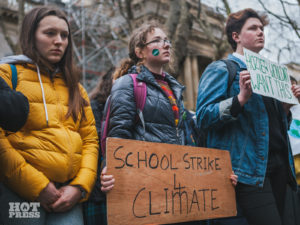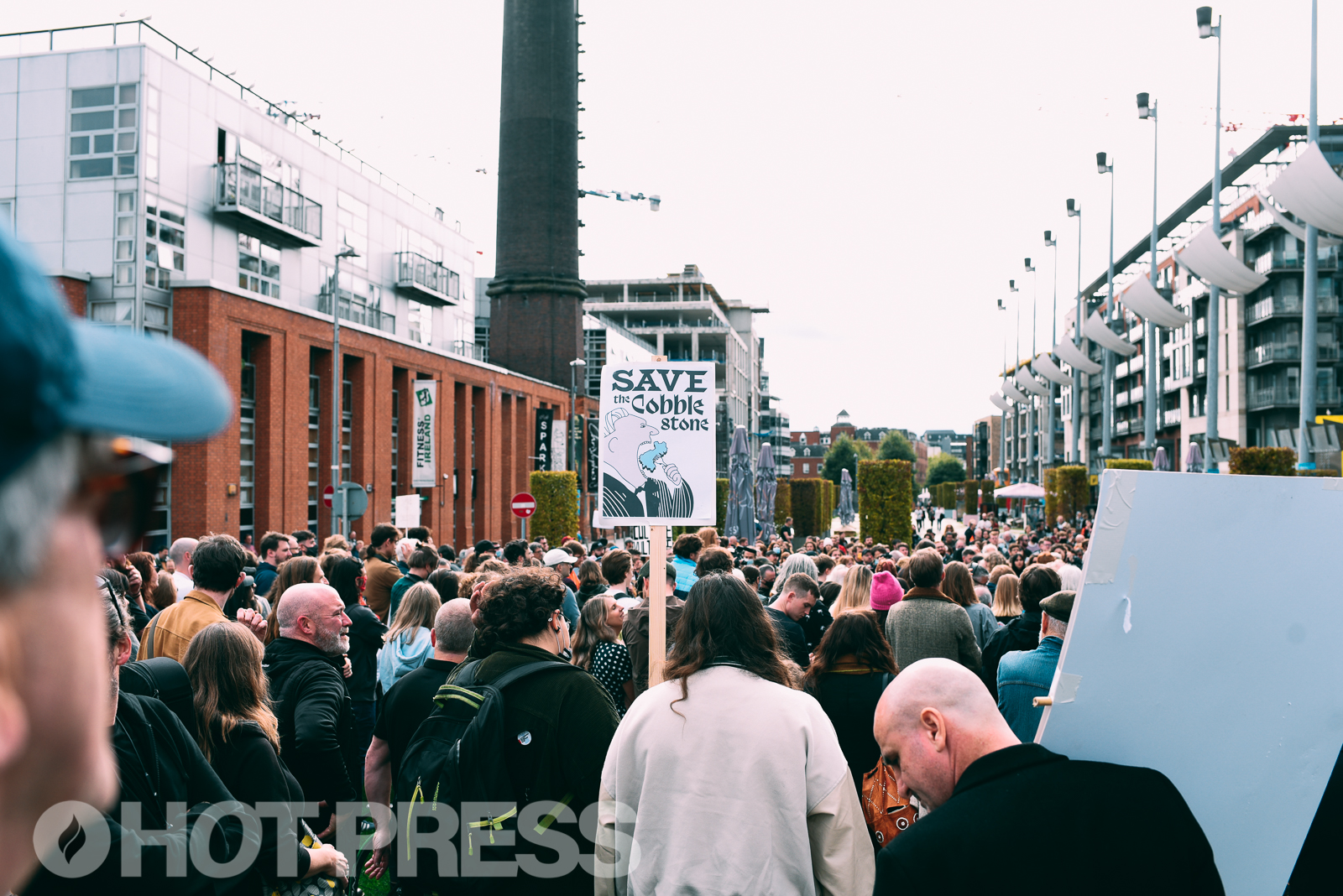- Lifestyle & Sports
- 27 Jan 22

You think we’ve been through the shit? Well, we have. The good news is that, over the next few months, things will return to something like normal. The bad news is that there’ll be a whole other heap of grief to contend with. But what exactly? Now, read on...
Change is upon us. Huge numbers, in Ireland, are infected with the Omicron version of Covid-19 – so many that close-contact rules have been set aside. Dr Clive Dix, ex-head of the UK’s vaccine task force says that we should treat it like flu and get on with life.
Well, we’ve all got a lot of ground to make up! NPHET and St Anthony have gone cold. So too have restrictions and pieties, online shopping and staycationing. Enough is enough!
Just watch, as everyone re-embraces shopping, exuberant fashion, entertainment, eating out till the wee hours, drinking and dancing and shifting in closed spaces, sex, anti-viral drugs and international travel!
As all of this potentially wonderful mayhem unfolds, here are the Top 10 hot topics likely to exercise us all in 2022. Don’t say you weren’t warned.
1. Women’s Rights, Women’s Safety
Advertisement
The appalling murder in Tullamore of the young national school teacher, Ashling Murphy, has shocked people to the core. There is no way that we can turn the clock back to erase the tragedy for Ashling, her family and her friends. The only thing we can do is to place women’s rights, including the right to safety, at the heart of the national agenda.
 Ashling Murphy vigil at the Leinster House, Dublin. Friday 14th of January 2022. Copyright Miguel Ruiz.
Ashling Murphy vigil at the Leinster House, Dublin. Friday 14th of January 2022. Copyright Miguel Ruiz.Some say we need to talk about this. Perhaps, but it’s far more important that we act, and that as a society we collectively set about making the safety of others a paramount concern. We have to start by making sure that everyone understands what this means in terms of their own actions, beliefs and behaviours.
How things were done ten, thirty, a hundred, a thousand years ago means nothing. We’re here now. It’s shocking that it’s still such a glaring issue, but it has to be recognised as such and addressed in a way that both alters the dynamic now and creates the conditions in which real change can take root.
We will have to address mental health issues and to invest money that is not now being spent on this crucial area. We will also have to confront sulphurous social media, where evil too often finds its match, and make those who publish it responsible in relation to dark web bile and propaganda.
The campaign will involve every family, every school, every workplace, including those who are working remotely. Education will, in the long term, be of the essence. More needs to be done, to teach children, and teenagers, how to interact. And we will, as a society, and a community, have to totally expunge the idea that it is okay for men to use violence, of any kind, as a way of getting what they want.
Advertisement
Nobody should leave school, be employed, join a club or open a social media account without knowing, and understanding, right down to their marrow, that this is a society that respects women – and in which women must be respected. That we are committed to treating every citizen equally. That verbal or physical intimidation – and especially violence of any kind – has no place in Ireland.
The right to feel safe walking the streets of your home place is a fundamental one. Nothing less is acceptable.
2. The Perils of Climate Change
Climate change is now humanity’s primary existential challenge.
We’re all familiar with the headline stories, the heat records and hottest years, the floods, the storms, the droughts. Well, two examples crystallise the enormity and the urgency of the issue.
The first is Thwaites Glacier in Antarctica, aka The Doomsday Glacier. It stretches 100km across the Antarctic coast and it is disintegrating. When it goes, and it will go soon, it’s likely to pull neighbouring glaciers with it and global sea levels will rise by three or four metres. The effect could be utterly devastating.
The second is at the other end of the world. There were 7,278 lightning strikes in the Arctic region in 2021. That’s nearly twice as many as the previous nine years combined.
Advertisement
Here’s the frightening part. Arctic air shouldn’t, under any circumstances, have the heat necessary to create lightning. Suddenly, it does, in spades. Something very dangerous is happening, right now.
Ireland has a plan. It may be a whistle in the dark. After all, the US and China are still wed to Old King Coal. But try we must.
The balancing act is tricky. For example, the ESB has cancelled three more contracts to build gas power plants in Dublin. Gas is a fossil fuel, though much less damaging to the environment than coal or oil.
Meanwhile, the wind is proving unreliable and, according to the experts, we’re a hair’s breadth away from blackouts. We are also increasingly dependent on British gas and electricity – which is not a good place to be.
The fragility of our energy supply lines is likely to affect our capacity to attract foreign direct investment. So we need to change tack.
Misanthropic eco-evangelicals – who take what is effectively a religious approach to the issue, and try to turn simple everyday activities into mortal sins for which people should be shunned or punished – aren’t helping.
Going back to a stone age approach is simply not a runner. Much better to think in terms of ideas, innovations, and the kind of ingenious paradigm shifts of which humans are uniquely capable.
Advertisement
 Pre Election Climate Strike 02/07/20 by Ava Holtzman
Pre Election Climate Strike 02/07/20 by Ava HoltzmanFor example, cattle are seen as a fundamental problem. But a bunch of bright scientists have realised that it’s not necessarily the cattle, but what they eat. Change their diet sufficiently and you do away with the methane gas. Well, we need more of that kind of blue sky thinking.
Even those who value science and expertise currently tend to miss the single biggest lesson to be learned from the pandemic, which is that an unprecedented pooling of scientific knowledge in the common interest successfully generated vaccines, and now antiviral medicines, in jig time.
Imagine what might happen if that learning were brought effectively to bear on climate change and with a similar awareness of the necessity for speed. Suddenly, in addition to the cuts and closures demanded by the fundamentalists and designed by the governmental managers, you’d generate scientific and engineering solutions that might allow us to think of flying again without any corrosive sense of guilt. As a counterweight to the new breed of increasingly dictatorial eco-authoritarians, you’d liberate the talents of explorers, creatives and eco-entrepreneurs. What a force for good that would be.
3. Beware the Papa State
Here’s a refrain you’ll hear a lot of this year: “We must learn from the pandemic”. And indeed, so we should. We just said it ourselves, in relation to climate change. But what exactly should we learn?
Advertisement
There are as many answers as there are experts. The benign view is that science, communications and organisation were harnessed for the public good, and health was brought centre stage.
Fine, but that is not the whole story, not by a long shot. Others used social media and the dark web to propagate lies and to stoke people’s fears. They shifted the loopier end of health preoccupation to the far right. The fact that so many ‘wellness’ freaks could transmute into anti-vaxxers might seem bizarre, but that’s what happened.
The new authoritarianism comes in many guises. Illiberal politicians exist on the left, on the right and among those who see climate issues in fundamentalist terms. And they have this in common: they have all noted how easily you can take control of society, impose curfews and lockdowns and shut down livelihoods. Just create enough panic.
Public health officials and experts have also certainly taken note.
In Ireland, the pandemic put them at the apex of Government and celebrity. And guess what? They like it there. Still burnished by their daily veneration in the official media, they’re already working on how to apply their new-found (and distinctly unelected) power to other spheres of our lives – like, for example, the consumption of alcohol, sugars and fats.
Where they and their fellow travellers want to take us is often derided as the Nanny State. But given its illiberalism, paternalism and condescension surely the Papa State would be more appropriate? Watch out for it. It could yet become a defining issue of 2022.
4. The Housing Crisis Is at Boiling Point
Advertisement
Home ownership among adults of prime working age has “collapsed” since the financial crisis. So says the Parliamentary Budget Office, which provides economic and budgetary information to TDs and Senators. The PBO rates the cost of housing here as “severely unaffordable” and it blames “rising rents” and “surging house prices.”
Who’d have thunk it, eh?
In fact, of course, the dogs in the street know already that our housing policy over the past twenty years has been an unmitigated disaster, with the financial crisis of 2007 and the collapse of the banks that precipitated it, adding immeasurably to the impossibility of it all.
This, in case the political big-wigs in the other parties haven’t worked it out yet, is the single most significant driver behind Sinn Féin’s rise in the polls. Most would-be home owners can’t see the Government turning this around any time soon. The Minister for Housing, Darragh O’Brien, seems to be determined to give it his best shot, and – unless things go haywire – he has potentially another three years to make a name for himself. But you get the feeling that it needs a more radical approach than this government has in its locker.
And the problem is that we really do need swift action if this is not to boil over into outright confrontation on the streets. We can guarantee that there will be increasing agitation and protests of the kind that kicked into play when the plans to build a hotel on the site of the Cobblestone pub were revealed. It’ll be the hottest of hot topics in 2022. The only possible conclusion is that blue sky thinking is needed here too…
 Save The Cobblestone protest in Smithfield, Dublin. Saturday 9th of October 2021. Copyright Miguel Ruiz.
Save The Cobblestone protest in Smithfield, Dublin. Saturday 9th of October 2021. Copyright Miguel Ruiz.Advertisement
5. Unhappy Anniversaries On The Way
“History is bunk”, said Henry Ford, the old school American capitalist adventurer, who founded the auto company that bore his name. Some of the more excitable political youth activists in Ireland might agree.
But history is going to be very hot indeed in 2022. At the end of January, we’ll all remember the 50th anniversary of Bloody Sunday in Derry, an appalling act of mass murder and perhaps the single most important trigger for the prolonged and vicious violence of the Troubles.
Many more 50th anniversaries will soon follow: of the Aldershot bombing in February, of Bloody Friday in July, of the introduction of internment without trial at the end of July, of Bloody Monday in Claudy, of the murderous campaign of the Shankill Butchers. It was the deadliest year of the Troubles. There are people out there who still have blood on their hands.
Meanwhile, January has already seen the centenary of the Irish government cabinet meeting that ratified the Anglo-Irish treaty. The handover of Dublin Castle has also been marked.
On June 28th comes the centenary of the outbreak of the Civil War. That conflict lasted till May 1923 but it has echoed through the politics of the State ever since. There were many casualties, the best known being Michael Collins, who was killed in an ambush on August 22nd 1922.
That anniversary will be marked as well. Collins is still very big box-office, one of the great icons of Irish history, and the centenary event at Béal na Bláth will excite huge interest, especially if – as appears very likely – an oration is given by Taoiseach Micheál Martin. After a century, the Civil War might finally be closed.
Advertisement
Far from being bunk, in 2022 history will be seen to be very much alive indeed. The important thing is that we can – and we must – learn from it.
6. A Mighty Trip With Ulysses
History takes many different guises. Ulysses, James Joyce’s towering achievement and one of the greatest novels of all, was first published in Paris by Sylvia Beach on February 2nd 1922, which was James Joyce’s 40th birthday. The publication of a work of fiction that remains at the very pinnacle of artistic achievement in any language, will be marked throughout the year with a variety of events and occasions. But we are looking forward to one in particular and hoping that there is a fair wind behind it in every way. What we want to see is a completely restriction-free Bloomsday in Dublin, on June 16th. It should be mighty craic altogether.
7. A Basic Income for Artists
The current administration has had a bit of a rough ride, with the Pandemic arriving along almost as soon as they had agreed a Programme for Government. But they have achieved a number of very good things irrespective, in particular in the area of the arts and culture. The latest potentially vital innovation is the move to introduce a basic income scheme for artists.
Opening an online consultation on the idea, Minister Catherine Martin (below) has called it a “once-in-a-generation policy intervention”. She’s right. And it could turn into a very hot topic indeed.
Currently, the government has earmarked €25 million for a plan that could radically alter the landscape for artists, including musicians, in Ireland. The initiative is scheduled for implementation later this year. It will be limited to two thousand arts and culture workers, for three years, at which point it will be evaluated and hopefully expanded. That limitation may be deemed necessary, but it is likely to be exploited by opposition politicians, who will have no difficulty asking why all artists don’t get it straight away.
Advertisement
The details are still in the air, especially to do with questions about eligibility and administration. It will cause great excitement – and, the arts being the arts, more than a little bitching! But, without a shadow of doubt, it will be a massive step in the right direction.
 Photo by: Martin Burton.
Photo by: Martin Burton.8. The Return of an Old Adversary
Recent weeks have seen the return of an old adversary – and it is likely to become an increasingly hot topic as the year rolls on. What are we talking about?
Inflation dogged economic and political life in the 1970s and 1980s. Indeed, only the establishment of the European Central Bank and the introduction of the Euro brought it to heel in this part of the world – and interest rates with it. Well, that particular idyll seems to be in danger of drifting into the past.
The new eruption of inflation is driven by energy costs, pushed upwards by green cuts to the use of coal and by increased competition from the east for Russian gas. There have also been raw material price hikes, an increased demand in relation to housing and supply chain issues as a result of the pandemic. Add in the Brexit ‘dividend’ – it is a fucking mess for all to see – and you have a toxic cocktail that could inflict damage here in Ireland.
Advertisement
The official European line is that this is still a temporary blip, and we hope they’re right. But with Vladimir Putin playing silly buggers in Ukraine, it seems almost inevitable that he will use the fact that Europe buys gas from Russia as leverage. If he does, then it could get very ugly indeed.
Where is The Skibereen Eagle – famous for “keeping an eye on the Czar of Russia” – now that we really need it?
9. How Do We Deal With Toxic Big Tech?
Some very powerful people – and institutions – did dreadful things during the pandemic. And they profited from them. Now, the hope is that they will be properly called to account.
In Ireland, and indeed throughout Europe, there’s increased focus on the extraordinary position that technology companies have claimed for themselves – and not just in relation to their tax arrangements.
Belatedly, it is being recognised that they have utterly abused the freedoms that were stupidly – and perhaps corruptly – allowed to them, originally in the US, and then by extension across the world.
There are huge issues in particular in relation to the creation of a new business model: surveillance capitalism. How many people knew that they were singing up to a brave new world order in which their every move – online, offline and almost everywhere else, including in the privacy of the toilet or the bedroom – would be tracked by massive Corporations, grown fat and self-serving on parcelling the data up and selling it on to anyone – including political vested interests and foreign secret services – with an interest in influencing the behaviour and the attitudes of citizens of countries all over the world, including in Ireland? The truth is that no one did, not really. And these tech outfits made a point of ensuring that they didn’t know until it was all a fait accompli. Until it was – they could say – all impossible to unravel.
Advertisement
This is where we are at at the beginning of 2022. Increasingly, however, it is being asked whether it’s acceptable for companies to enjoy enormous global power with what amounts to almost complete autonomy from oversight, accountability, social responsibility and governance. Enough is happening to forecast that it will remain a hot topic for the duration of 2022, not least because it is of such central importance to the battle for American democracy. Stay tuned. But not via social media if you can avoid it…
10. Corruption, Autocracy and The End of Democracy
Over the past six months, we have been fed what have now become almost daily revelations about the astonishing goings-on in the office of the UK’s prime minister, Boris Johnson. The main narrative is that Bojo’s been a very naughty boy and his government is a wretched mess. Even the red-top media are on his case, with the fact that there was a booze-up in No. 10 Downing the night before the Queen buried the late Prince Philip giving them the kind of ammunition they can’t possibly resist.
In truth, bad as the arrogant assumption that Covid restrictions were for the proles, but not for the Prime Minister and his cronies undoubtedly is, it is not anything like the worst of the political drift that has been happening in broad daylight under current Tory rule. The much more serious and deeply rooted scandal is that, over and over again, in all sorts of ways, Britain has plunged into a political culture that enables corruption of a kind that British people would laugh at, if they saw it happening elsewhere.
 09/03/2020. London, United Kingdom. No10. Prime Minister Boris Johnson with his partner Carrie Symonds leave No10 Downing Street for the Commonwealth Service at Westminster Abbey. Picture by Andrew Parsons / No 10 Downing Street
09/03/2020. London, United Kingdom. No10. Prime Minister Boris Johnson with his partner Carrie Symonds leave No10 Downing Street for the Commonwealth Service at Westminster Abbey. Picture by Andrew Parsons / No 10 Downing StreetUnder Boris Johnson’s grimy leadership, an assault is being mounted on the independence of the judiciary. The Metropolitan Police force is being turned into a laughing stock. There is a concerted attempt to strip the BBC of its independence. Naked threats are being made against cultural institutions that fail to internalise the Tory cultural agenda. There is an insistence that historic wrongs can no longer be admitted.
Advertisement
Worst of all, however, is the naked corruption of the fast track VIP lane for Covid contracts, overseen by Ministers, and created in order to funnel – as it did – hundreds of millions of British taxpayers’ money directly to supporters of the Conservative party. They would, of course, be expected to return some of it by way of donations to the Tories or the Prime Minister or both. Sleaze isn’t in it. This is blatant theft – the hallmarks of what might elsewhere be dismissed as a kleptocracy.
All of which is designed to weight an already appallingly lopsided political system further in favour of the Conservative Party, with the objective of establishing a one-party system of permanent Tory government. And they are getting away with it.
The UK desperately needs proportional representation. But first it needs to turf the Tories out.
Across the Atlantic, the revelations keep emerging on the man on whom Boris Johnson has, in so many ways, modelled his approach, Donald Trump. The ex-President of the United States is still battling to keep his financial records out of the public domain. Touch wood he’ll fail. Meanwhile, the panel investigating the insurrectionary acts of January 6th 2021, when a mob stormed the Capitol, are working furiously to corner Trump’s inner circle and force them to testify.
But it may be too little, too late. Trump still commands an inexplicable level of support among Republicans. And the lying, thieving, megalomaniac has successfully convinced most of them – with the help of social media, where fake news is the most common currency – that the election of 2020 was stolen from him, and from them.
At the moment, the Democrats control both houses, though they have a majority of only one in the Senate. With a third of the seats up for grabs in elections this year, they will find it very difficult to retain control. Potentially worse again, every seat in the House of Representatives is up for grabs. The Democrats currently have 225 seats versus 214 Republicans. They could lose control here too, turning Joe Biden into a lame duck President.
All the while, the Republicans campaign to seize control of the electoral process has been making ominous progress. They have established dominance in the Supreme Court. Simultaneously, they are involved in a massive, ongoing move to suppress the African-American vote. And they are passing laws in vital swing States which will allow them to prevent postal ballots, insist on voter ID, and even overturn the popular vote and declare the Electoral College votes centrally, in the event of a Democrat winning again in places like Georgia, Texas or Florida. The truth is that, while the coup of January 2021 failed, Trump and his lunatic lapdogs in the Republican Party are preparing the ground for a repeat.
Advertisement
Can they be stopped? The future of democracy in the land of the brave and the free will become an ever-hotter topic as 2022 progresses. We might wish that it were not so, but trust us.
This shit is only starting and it could get very ugly indeed.









